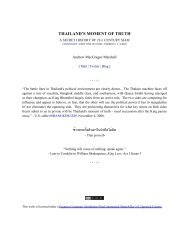THAILAND'S MOMENT OF TRUTH - ZENJOURNALIST
THAILAND'S MOMENT OF TRUTH - ZENJOURNALIST
THAILAND'S MOMENT OF TRUTH - ZENJOURNALIST
You also want an ePaper? Increase the reach of your titles
YUMPU automatically turns print PDFs into web optimized ePapers that Google loves.
challenge facing Thailand today, much more important than normal political issues of coalition<br />
management or competition for power, which clearly do factor into the mix of political<br />
dynamics...<br />
It is entirely possible King Bhumibol will return to his Hua Hin seaside palace several hours<br />
south of Bangkok in the coming days and live quietly for many years - postponing the day of<br />
reckoning and change that will inevitably come. In the meantime, the bustle of normal politics<br />
and changing societal attitudes will continue apace, while Thais keep a wary eye on the health of<br />
their ailing King. [09BANGKOK2488]<br />
Fear about the succession transfixes many Thais at all levels of society, and evidence of it can be seen<br />
everywhere.<br />
Duncan McCargo, professor of Southeast Asian politics at the University of Leeds, begins his study<br />
Thailand: State of Anxiety in Southeast Asian Affairs in 2008 with a reference to an obsession that<br />
swept the nation for magical amulets originally created by policeman in the southern town of Nakhon Si<br />
Thammarat. They became so wildly popular that in April 2007 a woman was killed in a stampede at the<br />
temple where they were made, and crime wave spread worsening havoc through the town as Thais unable<br />
or unwilling to buy the amulets decided to try stealing them instead. The chaos prompted Thailand’s<br />
supreme patriarch - the most senior Buddhist monk in the kingdom - to declare he would no longer<br />
provide some of the sacred ingredients, such as incense ash from his temple, used in the production of the<br />
lucky amulets.<br />
"Today, Thai people are without hope … there is no certainty in their lives."<br />
This statement came not from one of Thailand's many academics or social critics, but from a<br />
popular young entertainer, Patcharasri "Kalamare" Benjamas. She was writing about the national<br />
anxiety epitomized by the extraordinary cult of Jatukham Ramathep amulets which seized<br />
Thailand in late 2006 and the first half of 2007. Deeply uneasy about the economy, politics, and<br />
the royal succession, Thais bought tens of millions of these much-hyped amulets to protect them<br />
from adversity....<br />
The fevered collective enthusiasm for monarchy seen during 2006 and 2007 had a darker<br />
downside, testifying to growing national anxiety about the royal succession... The inability of the<br />
palace to address public anxiety about the succession threatened to undermine the glory of the<br />
Ninth Reign. [McCargo, Thailand: State of Anxiety]<br />
McCargo has convincingly argued that the gruesome mutation that afflicted the Yellow Shirt movement<br />
of the People’s Alliance for Democracy is also a symptom of the panic stalking Thailand as the Bhumibol<br />
era comes to an end. The Yellow Shirts were initially a broad-based and relatively good-humoured<br />
alliance from across the ideological and political spectrum that drew together royalists and liberals,<br />
radical students and middle-class aunties, progressive activists and patrician establishment patriarchs,<br />
united in opposition to the increasingly baleful influence of Thaksin Shinawatra; over the years they<br />
morphed into a proto-fascist mob of hateful extremists addicted to the bloodcurdling rhetoric of rabble-




